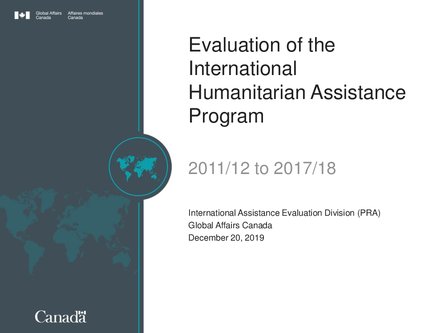
During the evaluation period (2011/12 to 2017/18), Canada was a consistent and respected humanitarian donor that responded to needs in humanitarian crises. It was recognized as timely, flexible and principled. Its humanitarian spending has declined in relation to other donors over the period. It could further increase its effectiveness and strengthen its role in the global humanitarian policy sphere.
The IHA Program (IHA) responded quickly and effectively in rapid-onset crises; increasing its use of drawdown mechanisms and benefiting from rapid approval processes that are unique to IHA and essential for humanitarian results. Conversely, its means to respond to protracted crises could be streamlined. IHA introduced a number of measures to improve performance and enhance flexibility, such as multi-year funding, reduced earmarking and greater support for pooled funds. However, the annual project selection process for protracted crises was unnecessarily burdensome for IHA staff and partners. There were also significant departmental barriers inhibiting work in the humanitarian-development-peace nexus in protracted crises. While staff in the department’s different program streams demonstrated nexus thinking and cooperated informally, there was a lack of overall departmental guidance on the nexus, and the process constraints of different program streams made cooperation difficult. The department has an opportunity to create a better nexus response, guided by Canada’s Feminist International Assistance Policy, the Grand Bargain and the OECD’s DAC Recommendation on the Humanitarian-Development-Peace Nexus.